LSME Unit 35: Developing Individuals, Teams, and Organizations Report
VerifiedAdded on 2022/11/25
|17
|4314
|1
Report
AI Summary
This report provides a comprehensive analysis of developing individuals, teams, and organizations within a business context. It begins by examining the essential knowledge, skills, and behaviors required by HR professionals, including skills assessment, communication, and conflict resolution. The report then delves into individual and organizational learning, training, and development, highlighting the differences and their impact on sustainable business performance. Furthermore, it explores the contribution of high-performance working (HPW) to employee engagement and competitive advantage, assessing its benefits and mechanisms. Finally, the report evaluates various performance management approaches and their effectiveness in fostering a high-performance culture and commitment, including a professional development plan and reflective statements.
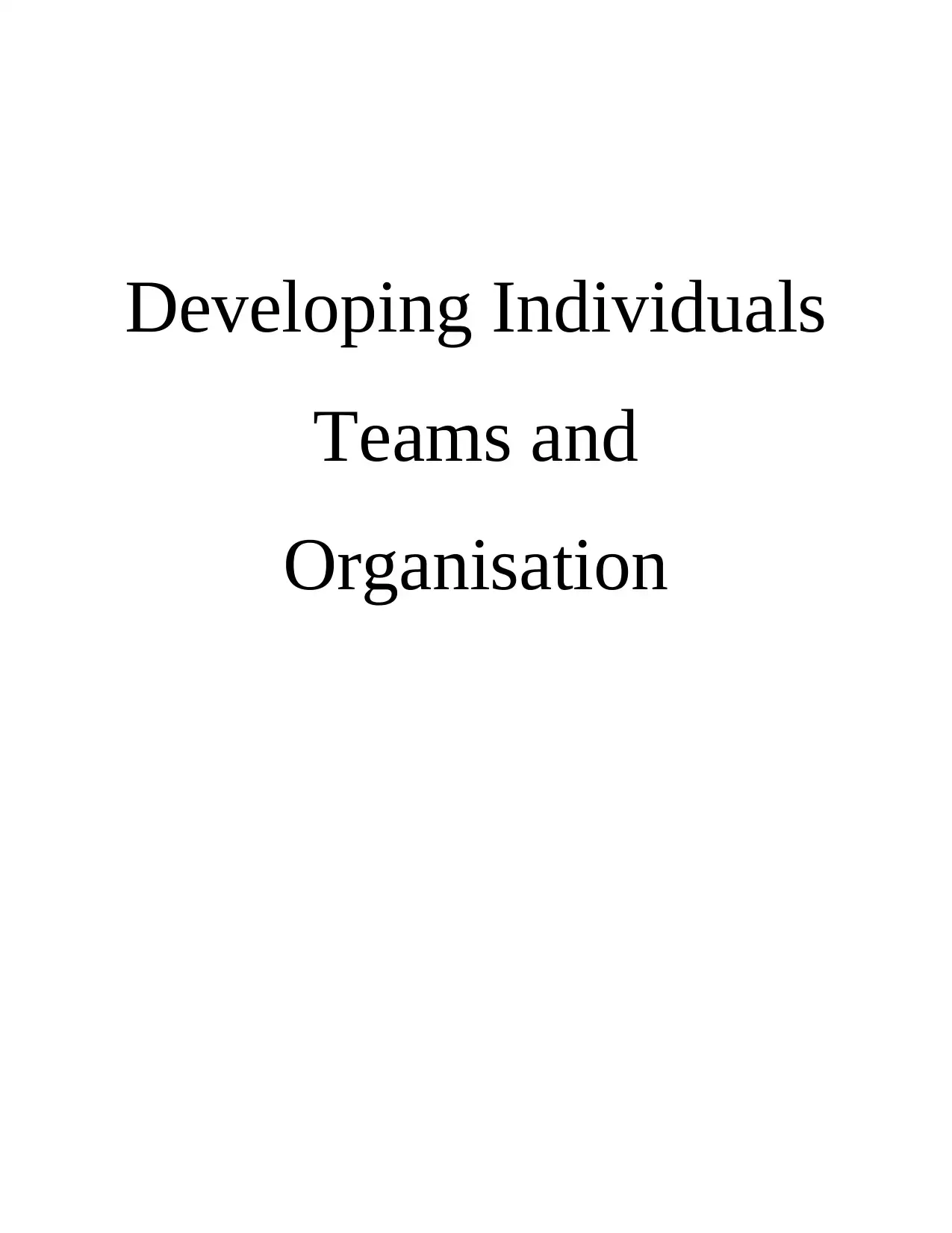
Developing Individuals
Teams and
Organisation
Teams and
Organisation
Paraphrase This Document
Need a fresh take? Get an instant paraphrase of this document with our AI Paraphraser
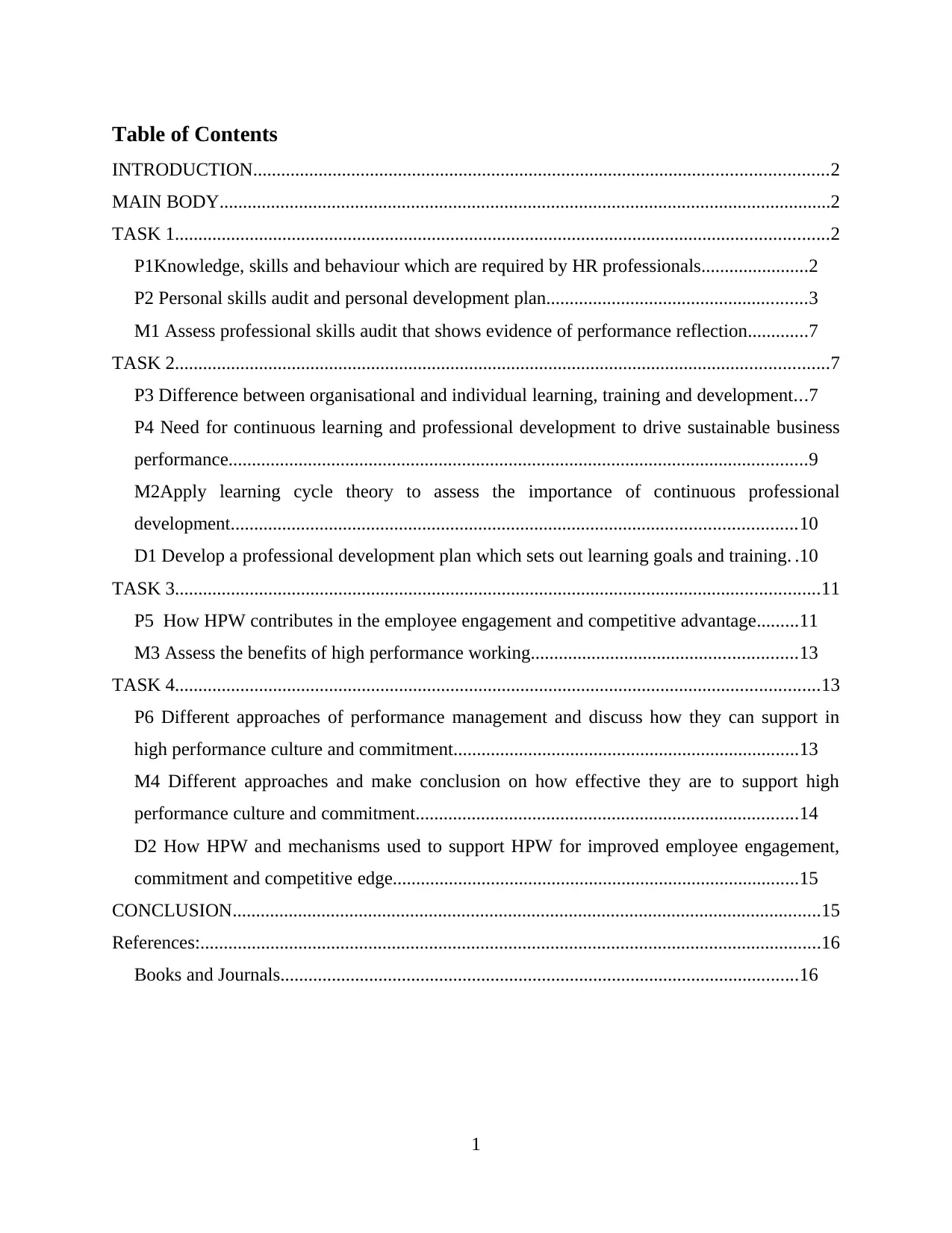
Table of Contents
INTRODUCTION...........................................................................................................................2
MAIN BODY...................................................................................................................................2
TASK 1............................................................................................................................................2
P1Knowledge, skills and behaviour which are required by HR professionals.......................2
P2 Personal skills audit and personal development plan........................................................3
M1 Assess professional skills audit that shows evidence of performance reflection.............7
TASK 2............................................................................................................................................7
P3 Difference between organisational and individual learning, training and development...7
P4 Need for continuous learning and professional development to drive sustainable business
performance............................................................................................................................9
M2Apply learning cycle theory to assess the importance of continuous professional
development.........................................................................................................................10
D1 Develop a professional development plan which sets out learning goals and training. .10
TASK 3..........................................................................................................................................11
P5 How HPW contributes in the employee engagement and competitive advantage.........11
M3 Assess the benefits of high performance working.........................................................13
TASK 4..........................................................................................................................................13
P6 Different approaches of performance management and discuss how they can support in
high performance culture and commitment..........................................................................13
M4 Different approaches and make conclusion on how effective they are to support high
performance culture and commitment..................................................................................14
D2 How HPW and mechanisms used to support HPW for improved employee engagement,
commitment and competitive edge.......................................................................................15
CONCLUSION..............................................................................................................................15
References:.....................................................................................................................................16
Books and Journals...............................................................................................................16
1
INTRODUCTION...........................................................................................................................2
MAIN BODY...................................................................................................................................2
TASK 1............................................................................................................................................2
P1Knowledge, skills and behaviour which are required by HR professionals.......................2
P2 Personal skills audit and personal development plan........................................................3
M1 Assess professional skills audit that shows evidence of performance reflection.............7
TASK 2............................................................................................................................................7
P3 Difference between organisational and individual learning, training and development...7
P4 Need for continuous learning and professional development to drive sustainable business
performance............................................................................................................................9
M2Apply learning cycle theory to assess the importance of continuous professional
development.........................................................................................................................10
D1 Develop a professional development plan which sets out learning goals and training. .10
TASK 3..........................................................................................................................................11
P5 How HPW contributes in the employee engagement and competitive advantage.........11
M3 Assess the benefits of high performance working.........................................................13
TASK 4..........................................................................................................................................13
P6 Different approaches of performance management and discuss how they can support in
high performance culture and commitment..........................................................................13
M4 Different approaches and make conclusion on how effective they are to support high
performance culture and commitment..................................................................................14
D2 How HPW and mechanisms used to support HPW for improved employee engagement,
commitment and competitive edge.......................................................................................15
CONCLUSION..............................................................................................................................15
References:.....................................................................................................................................16
Books and Journals...............................................................................................................16
1
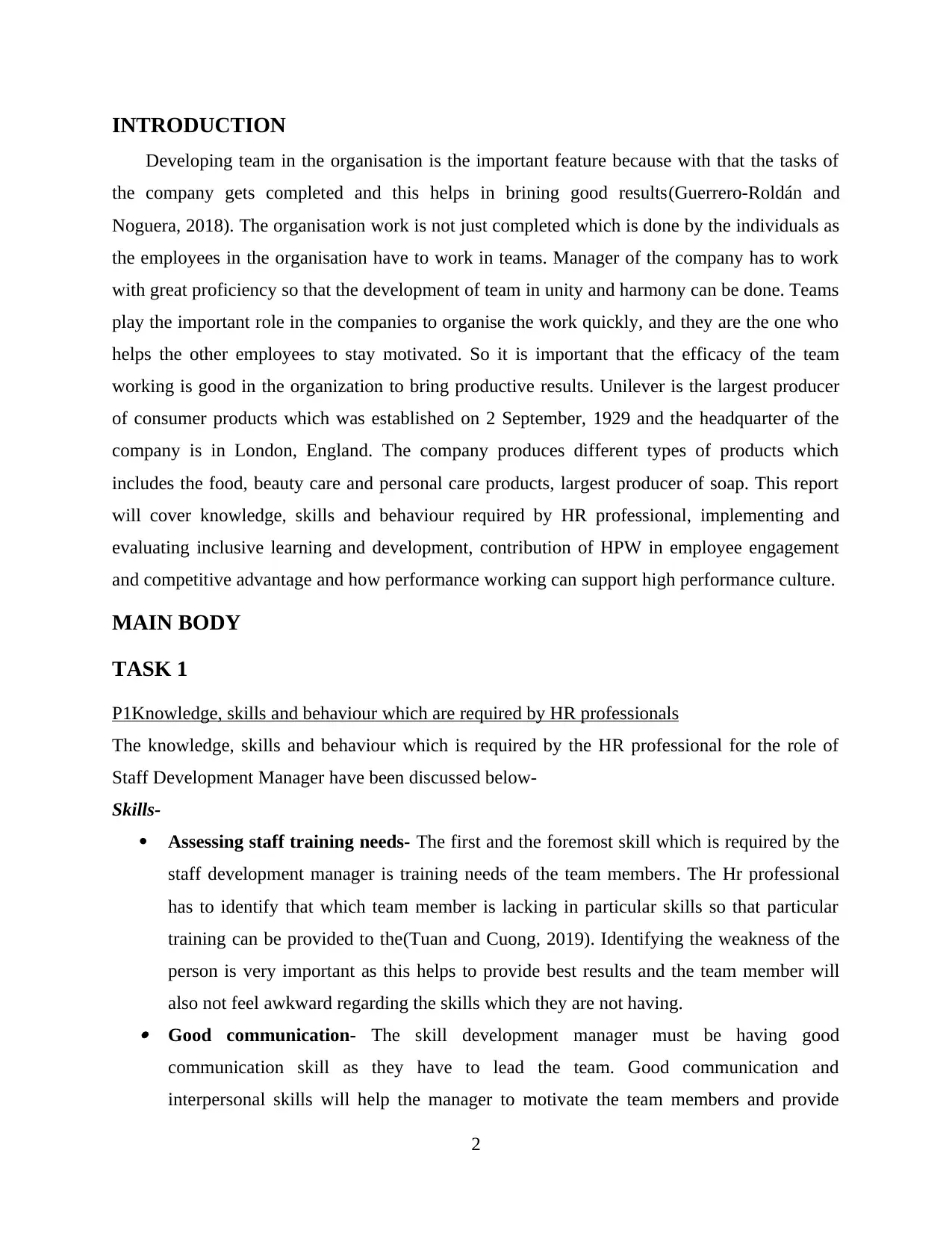
INTRODUCTION
Developing team in the organisation is the important feature because with that the tasks of
the company gets completed and this helps in brining good results(Guerrero-Roldán and
Noguera, 2018). The organisation work is not just completed which is done by the individuals as
the employees in the organisation have to work in teams. Manager of the company has to work
with great proficiency so that the development of team in unity and harmony can be done. Teams
play the important role in the companies to organise the work quickly, and they are the one who
helps the other employees to stay motivated. So it is important that the efficacy of the team
working is good in the organization to bring productive results. Unilever is the largest producer
of consumer products which was established on 2 September, 1929 and the headquarter of the
company is in London, England. The company produces different types of products which
includes the food, beauty care and personal care products, largest producer of soap. This report
will cover knowledge, skills and behaviour required by HR professional, implementing and
evaluating inclusive learning and development, contribution of HPW in employee engagement
and competitive advantage and how performance working can support high performance culture.
MAIN BODY
TASK 1
P1Knowledge, skills and behaviour which are required by HR professionals
The knowledge, skills and behaviour which is required by the HR professional for the role of
Staff Development Manager have been discussed below-
Skills-
Assessing staff training needs- The first and the foremost skill which is required by the
staff development manager is training needs of the team members. The Hr professional
has to identify that which team member is lacking in particular skills so that particular
training can be provided to the(Tuan and Cuong, 2019). Identifying the weakness of the
person is very important as this helps to provide best results and the team member will
also not feel awkward regarding the skills which they are not having. Good communication- The skill development manager must be having good
communication skill as they have to lead the team. Good communication and
interpersonal skills will help the manager to motivate the team members and provide
2
Developing team in the organisation is the important feature because with that the tasks of
the company gets completed and this helps in brining good results(Guerrero-Roldán and
Noguera, 2018). The organisation work is not just completed which is done by the individuals as
the employees in the organisation have to work in teams. Manager of the company has to work
with great proficiency so that the development of team in unity and harmony can be done. Teams
play the important role in the companies to organise the work quickly, and they are the one who
helps the other employees to stay motivated. So it is important that the efficacy of the team
working is good in the organization to bring productive results. Unilever is the largest producer
of consumer products which was established on 2 September, 1929 and the headquarter of the
company is in London, England. The company produces different types of products which
includes the food, beauty care and personal care products, largest producer of soap. This report
will cover knowledge, skills and behaviour required by HR professional, implementing and
evaluating inclusive learning and development, contribution of HPW in employee engagement
and competitive advantage and how performance working can support high performance culture.
MAIN BODY
TASK 1
P1Knowledge, skills and behaviour which are required by HR professionals
The knowledge, skills and behaviour which is required by the HR professional for the role of
Staff Development Manager have been discussed below-
Skills-
Assessing staff training needs- The first and the foremost skill which is required by the
staff development manager is training needs of the team members. The Hr professional
has to identify that which team member is lacking in particular skills so that particular
training can be provided to the(Tuan and Cuong, 2019). Identifying the weakness of the
person is very important as this helps to provide best results and the team member will
also not feel awkward regarding the skills which they are not having. Good communication- The skill development manager must be having good
communication skill as they have to lead the team. Good communication and
interpersonal skills will help the manager to motivate the team members and provide
2
⊘ This is a preview!⊘
Do you want full access?
Subscribe today to unlock all pages.

Trusted by 1+ million students worldwide
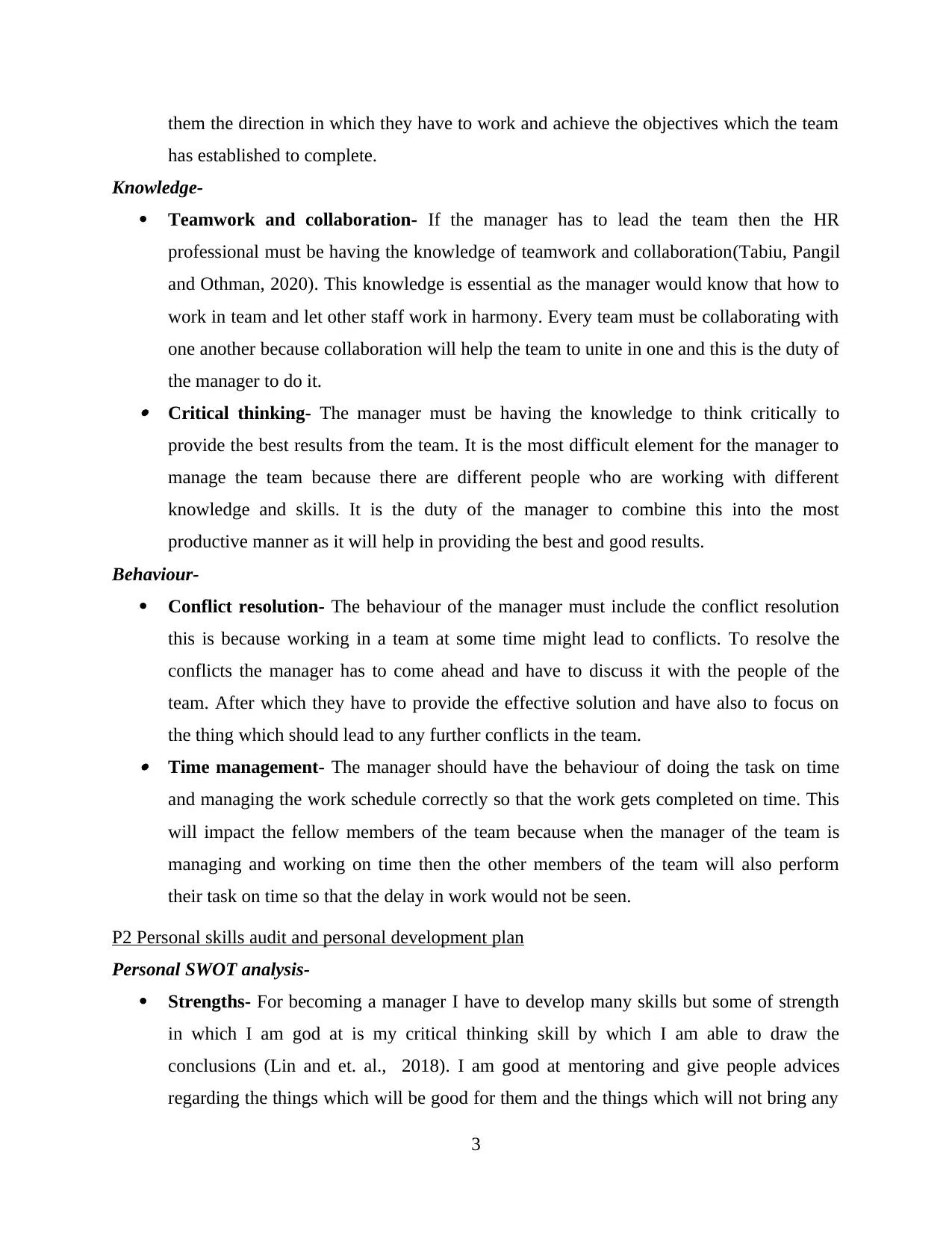
them the direction in which they have to work and achieve the objectives which the team
has established to complete.
Knowledge-
Teamwork and collaboration- If the manager has to lead the team then the HR
professional must be having the knowledge of teamwork and collaboration(Tabiu, Pangil
and Othman, 2020). This knowledge is essential as the manager would know that how to
work in team and let other staff work in harmony. Every team must be collaborating with
one another because collaboration will help the team to unite in one and this is the duty of
the manager to do it. Critical thinking- The manager must be having the knowledge to think critically to
provide the best results from the team. It is the most difficult element for the manager to
manage the team because there are different people who are working with different
knowledge and skills. It is the duty of the manager to combine this into the most
productive manner as it will help in providing the best and good results.
Behaviour-
Conflict resolution- The behaviour of the manager must include the conflict resolution
this is because working in a team at some time might lead to conflicts. To resolve the
conflicts the manager has to come ahead and have to discuss it with the people of the
team. After which they have to provide the effective solution and have also to focus on
the thing which should lead to any further conflicts in the team. Time management- The manager should have the behaviour of doing the task on time
and managing the work schedule correctly so that the work gets completed on time. This
will impact the fellow members of the team because when the manager of the team is
managing and working on time then the other members of the team will also perform
their task on time so that the delay in work would not be seen.
P2 Personal skills audit and personal development plan
Personal SWOT analysis-
Strengths- For becoming a manager I have to develop many skills but some of strength
in which I am god at is my critical thinking skill by which I am able to draw the
conclusions (Lin and et. al., 2018). I am good at mentoring and give people advices
regarding the things which will be good for them and the things which will not bring any
3
has established to complete.
Knowledge-
Teamwork and collaboration- If the manager has to lead the team then the HR
professional must be having the knowledge of teamwork and collaboration(Tabiu, Pangil
and Othman, 2020). This knowledge is essential as the manager would know that how to
work in team and let other staff work in harmony. Every team must be collaborating with
one another because collaboration will help the team to unite in one and this is the duty of
the manager to do it. Critical thinking- The manager must be having the knowledge to think critically to
provide the best results from the team. It is the most difficult element for the manager to
manage the team because there are different people who are working with different
knowledge and skills. It is the duty of the manager to combine this into the most
productive manner as it will help in providing the best and good results.
Behaviour-
Conflict resolution- The behaviour of the manager must include the conflict resolution
this is because working in a team at some time might lead to conflicts. To resolve the
conflicts the manager has to come ahead and have to discuss it with the people of the
team. After which they have to provide the effective solution and have also to focus on
the thing which should lead to any further conflicts in the team. Time management- The manager should have the behaviour of doing the task on time
and managing the work schedule correctly so that the work gets completed on time. This
will impact the fellow members of the team because when the manager of the team is
managing and working on time then the other members of the team will also perform
their task on time so that the delay in work would not be seen.
P2 Personal skills audit and personal development plan
Personal SWOT analysis-
Strengths- For becoming a manager I have to develop many skills but some of strength
in which I am god at is my critical thinking skill by which I am able to draw the
conclusions (Lin and et. al., 2018). I am good at mentoring and give people advices
regarding the things which will be good for them and the things which will not bring any
3
Paraphrase This Document
Need a fresh take? Get an instant paraphrase of this document with our AI Paraphraser
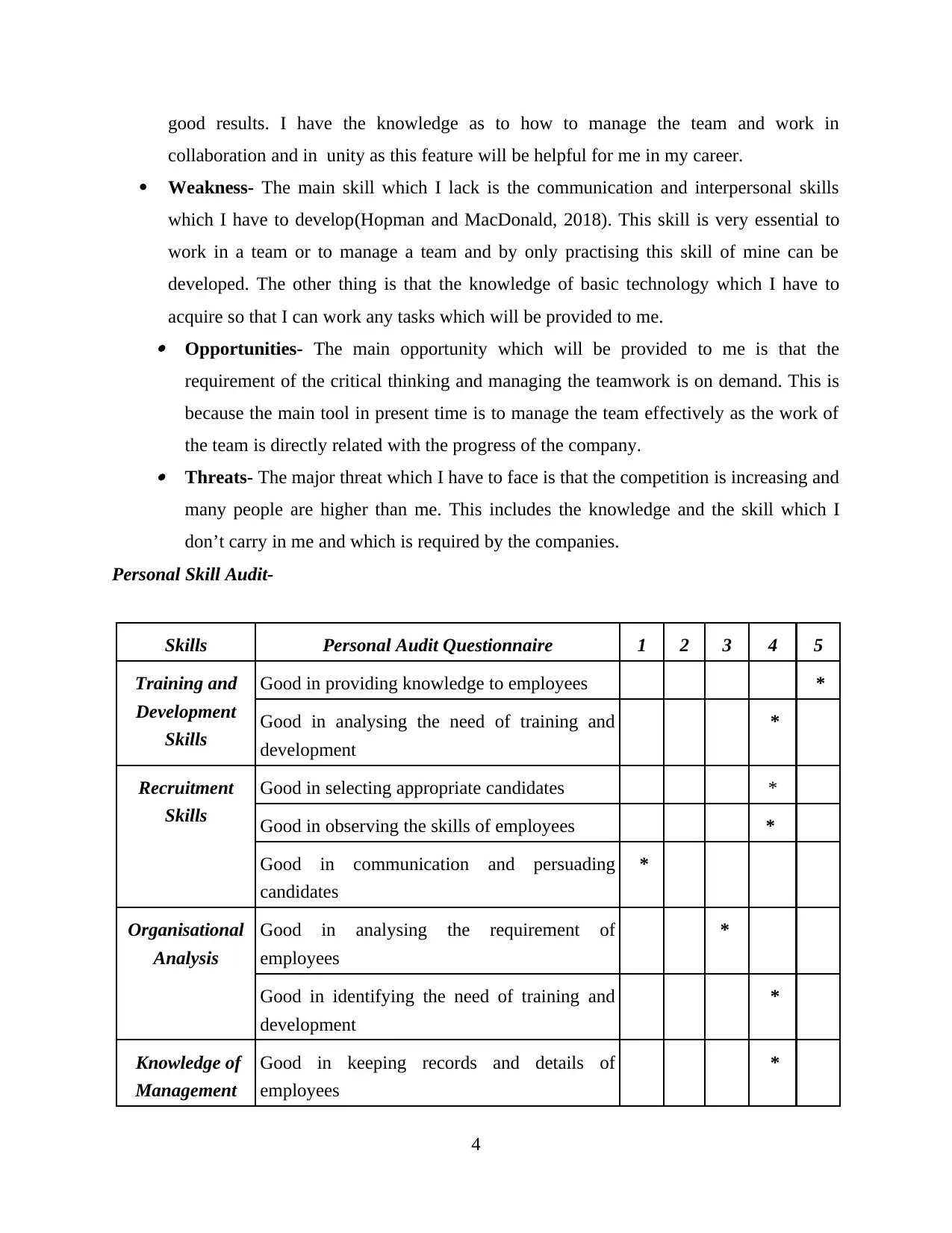
good results. I have the knowledge as to how to manage the team and work in
collaboration and in unity as this feature will be helpful for me in my career.
Weakness- The main skill which I lack is the communication and interpersonal skills
which I have to develop(Hopman and MacDonald, 2018). This skill is very essential to
work in a team or to manage a team and by only practising this skill of mine can be
developed. The other thing is that the knowledge of basic technology which I have to
acquire so that I can work any tasks which will be provided to me.
Opportunities- The main opportunity which will be provided to me is that the
requirement of the critical thinking and managing the teamwork is on demand. This is
because the main tool in present time is to manage the team effectively as the work of
the team is directly related with the progress of the company.
Threats- The major threat which I have to face is that the competition is increasing and
many people are higher than me. This includes the knowledge and the skill which I
don’t carry in me and which is required by the companies.
Personal Skill Audit-
Skills Personal Audit Questionnaire 1 2 3 4 5
Training and
Development
Skills
Good in providing knowledge to employees *
Good in analysing the need of training and
development
*
Recruitment
Skills
Good in selecting appropriate candidates *
Good in observing the skills of employees *
Good in communication and persuading
candidates
*
Organisational
Analysis
Good in analysing the requirement of
employees
*
Good in identifying the need of training and
development
*
Knowledge of
Management
Good in keeping records and details of
employees
*
4
collaboration and in unity as this feature will be helpful for me in my career.
Weakness- The main skill which I lack is the communication and interpersonal skills
which I have to develop(Hopman and MacDonald, 2018). This skill is very essential to
work in a team or to manage a team and by only practising this skill of mine can be
developed. The other thing is that the knowledge of basic technology which I have to
acquire so that I can work any tasks which will be provided to me.
Opportunities- The main opportunity which will be provided to me is that the
requirement of the critical thinking and managing the teamwork is on demand. This is
because the main tool in present time is to manage the team effectively as the work of
the team is directly related with the progress of the company.
Threats- The major threat which I have to face is that the competition is increasing and
many people are higher than me. This includes the knowledge and the skill which I
don’t carry in me and which is required by the companies.
Personal Skill Audit-
Skills Personal Audit Questionnaire 1 2 3 4 5
Training and
Development
Skills
Good in providing knowledge to employees *
Good in analysing the need of training and
development
*
Recruitment
Skills
Good in selecting appropriate candidates *
Good in observing the skills of employees *
Good in communication and persuading
candidates
*
Organisational
Analysis
Good in analysing the requirement of
employees
*
Good in identifying the need of training and
development
*
Knowledge of
Management
Good in keeping records and details of
employees
*
4
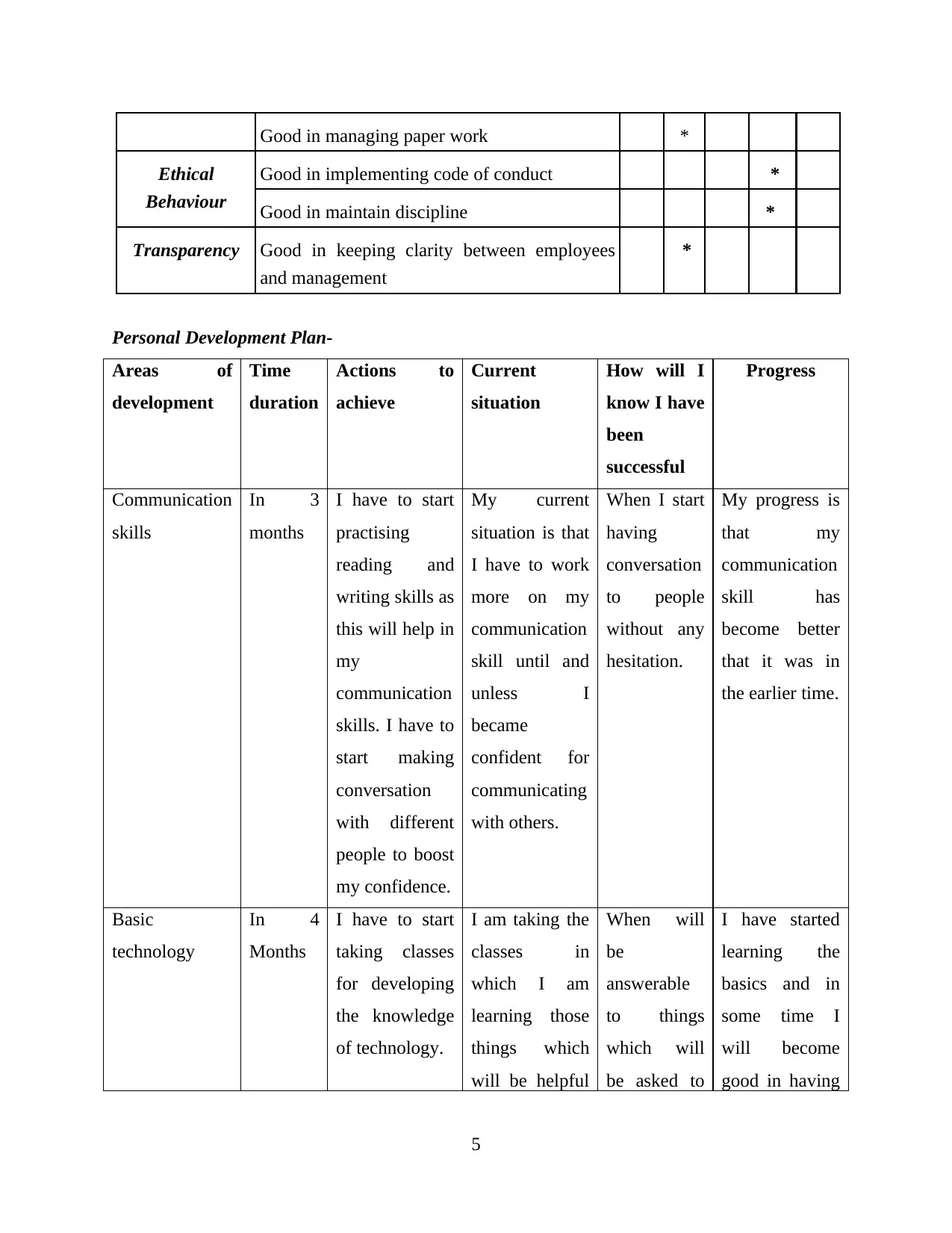
Good in managing paper work *
Ethical
Behaviour
Good in implementing code of conduct *
Good in maintain discipline *
Transparency Good in keeping clarity between employees
and management
*
Personal Development Plan-
Areas of
development
Time
duration
Actions to
achieve
Current
situation
How will I
know I have
been
successful
Progress
Communication
skills
In 3
months
I have to start
practising
reading and
writing skills as
this will help in
my
communication
skills. I have to
start making
conversation
with different
people to boost
my confidence.
My current
situation is that
I have to work
more on my
communication
skill until and
unless I
became
confident for
communicating
with others.
When I start
having
conversation
to people
without any
hesitation.
My progress is
that my
communication
skill has
become better
that it was in
the earlier time.
Basic
technology
In 4
Months
I have to start
taking classes
for developing
the knowledge
of technology.
I am taking the
classes in
which I am
learning those
things which
will be helpful
When will
be
answerable
to things
which will
be asked to
I have started
learning the
basics and in
some time I
will become
good in having
5
Ethical
Behaviour
Good in implementing code of conduct *
Good in maintain discipline *
Transparency Good in keeping clarity between employees
and management
*
Personal Development Plan-
Areas of
development
Time
duration
Actions to
achieve
Current
situation
How will I
know I have
been
successful
Progress
Communication
skills
In 3
months
I have to start
practising
reading and
writing skills as
this will help in
my
communication
skills. I have to
start making
conversation
with different
people to boost
my confidence.
My current
situation is that
I have to work
more on my
communication
skill until and
unless I
became
confident for
communicating
with others.
When I start
having
conversation
to people
without any
hesitation.
My progress is
that my
communication
skill has
become better
that it was in
the earlier time.
Basic
technology
In 4
Months
I have to start
taking classes
for developing
the knowledge
of technology.
I am taking the
classes in
which I am
learning those
things which
will be helpful
When will
be
answerable
to things
which will
be asked to
I have started
learning the
basics and in
some time I
will become
good in having
5
⊘ This is a preview!⊘
Do you want full access?
Subscribe today to unlock all pages.

Trusted by 1+ million students worldwide
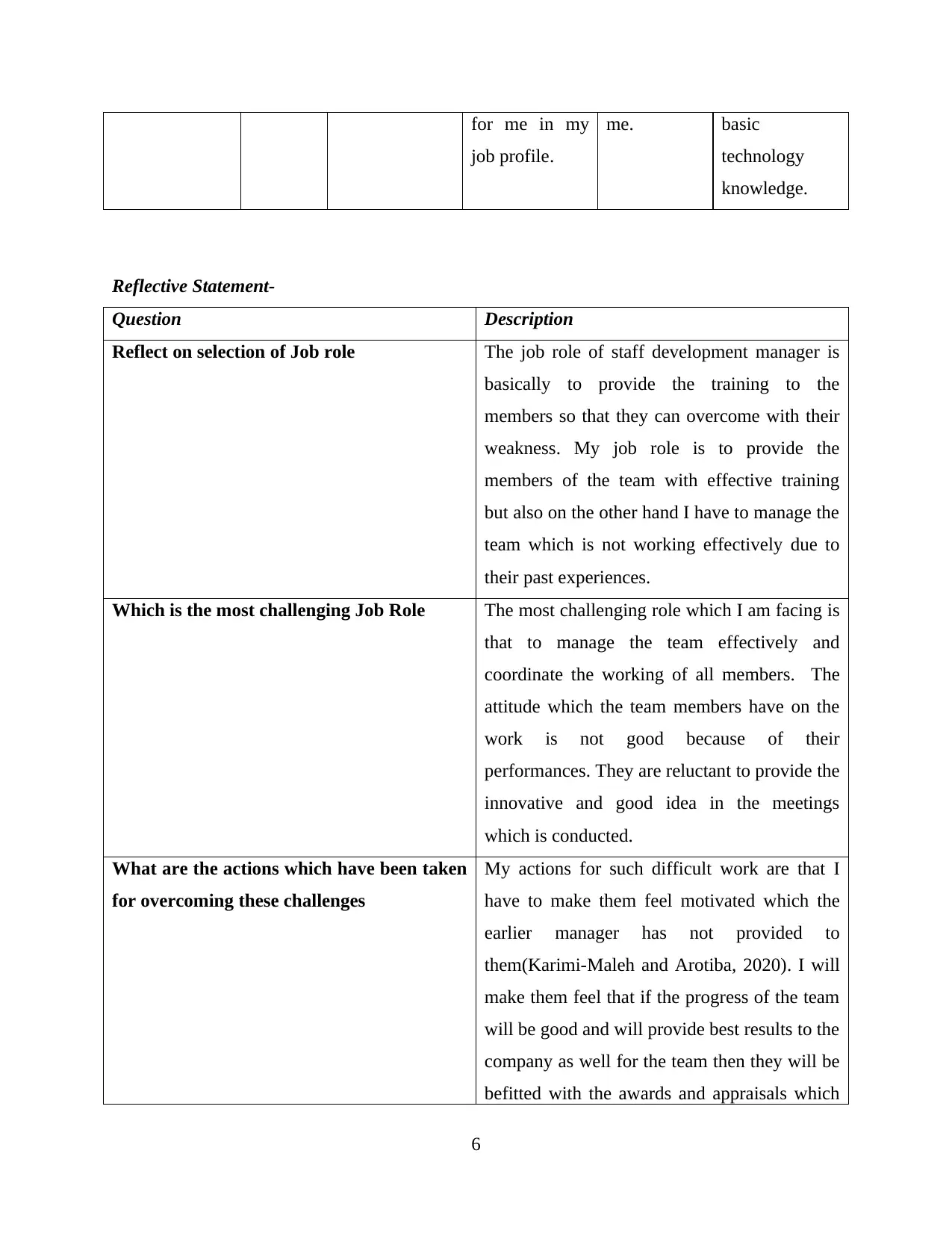
for me in my
job profile.
me. basic
technology
knowledge.
Reflective Statement-
Question Description
Reflect on selection of Job role The job role of staff development manager is
basically to provide the training to the
members so that they can overcome with their
weakness. My job role is to provide the
members of the team with effective training
but also on the other hand I have to manage the
team which is not working effectively due to
their past experiences.
Which is the most challenging Job Role The most challenging role which I am facing is
that to manage the team effectively and
coordinate the working of all members. The
attitude which the team members have on the
work is not good because of their
performances. They are reluctant to provide the
innovative and good idea in the meetings
which is conducted.
What are the actions which have been taken
for overcoming these challenges
My actions for such difficult work are that I
have to make them feel motivated which the
earlier manager has not provided to
them(Karimi-Maleh and Arotiba, 2020). I will
make them feel that if the progress of the team
will be good and will provide best results to the
company as well for the team then they will be
befitted with the awards and appraisals which
6
job profile.
me. basic
technology
knowledge.
Reflective Statement-
Question Description
Reflect on selection of Job role The job role of staff development manager is
basically to provide the training to the
members so that they can overcome with their
weakness. My job role is to provide the
members of the team with effective training
but also on the other hand I have to manage the
team which is not working effectively due to
their past experiences.
Which is the most challenging Job Role The most challenging role which I am facing is
that to manage the team effectively and
coordinate the working of all members. The
attitude which the team members have on the
work is not good because of their
performances. They are reluctant to provide the
innovative and good idea in the meetings
which is conducted.
What are the actions which have been taken
for overcoming these challenges
My actions for such difficult work are that I
have to make them feel motivated which the
earlier manager has not provided to
them(Karimi-Maleh and Arotiba, 2020). I will
make them feel that if the progress of the team
will be good and will provide best results to the
company as well for the team then they will be
befitted with the awards and appraisals which
6
Paraphrase This Document
Need a fresh take? Get an instant paraphrase of this document with our AI Paraphraser
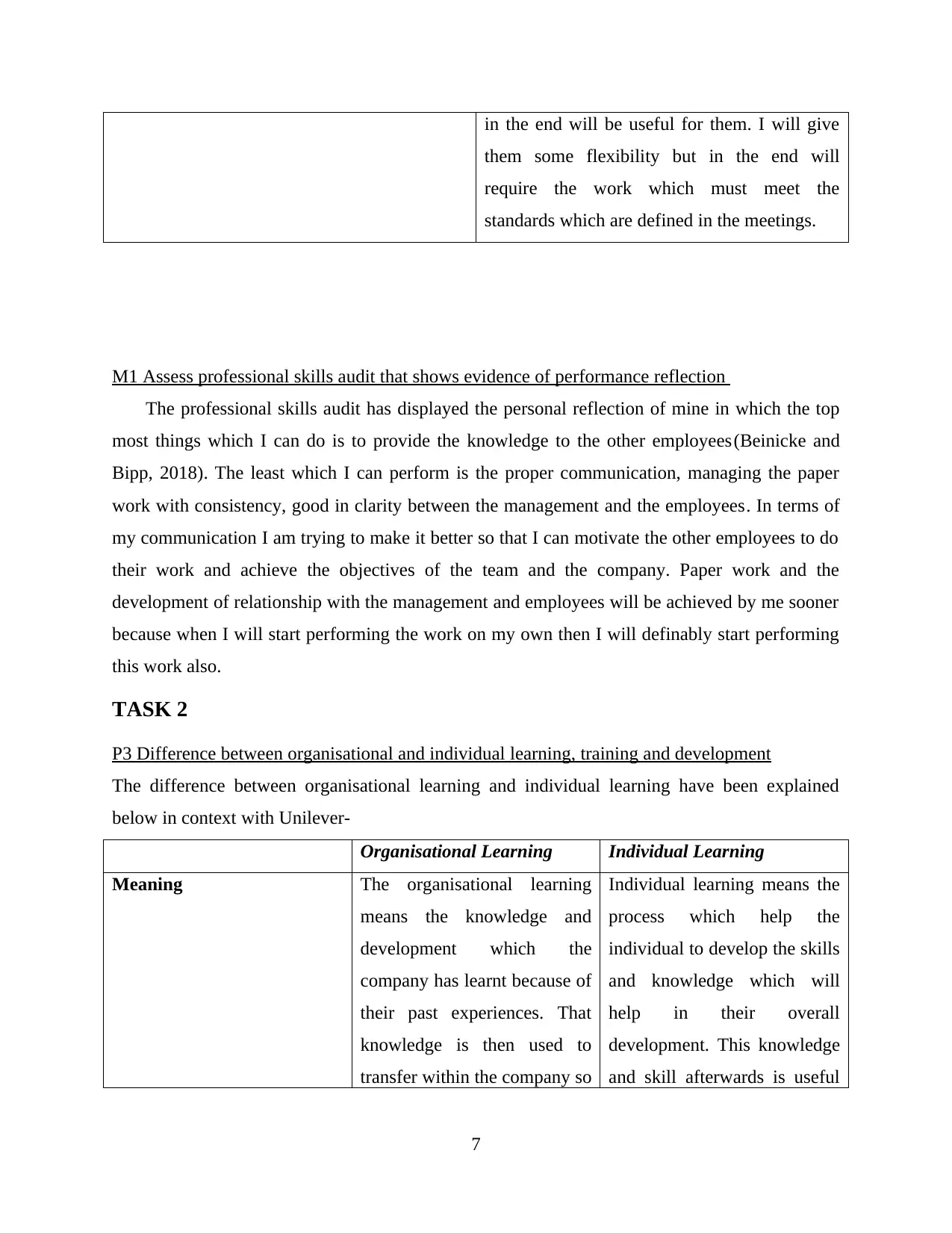
in the end will be useful for them. I will give
them some flexibility but in the end will
require the work which must meet the
standards which are defined in the meetings.
M1 Assess professional skills audit that shows evidence of performance reflection
The professional skills audit has displayed the personal reflection of mine in which the top
most things which I can do is to provide the knowledge to the other employees(Beinicke and
Bipp, 2018). The least which I can perform is the proper communication, managing the paper
work with consistency, good in clarity between the management and the employees. In terms of
my communication I am trying to make it better so that I can motivate the other employees to do
their work and achieve the objectives of the team and the company. Paper work and the
development of relationship with the management and employees will be achieved by me sooner
because when I will start performing the work on my own then I will definably start performing
this work also.
TASK 2
P3 Difference between organisational and individual learning, training and development
The difference between organisational learning and individual learning have been explained
below in context with Unilever-
Organisational Learning Individual Learning
Meaning The organisational learning
means the knowledge and
development which the
company has learnt because of
their past experiences. That
knowledge is then used to
transfer within the company so
Individual learning means the
process which help the
individual to develop the skills
and knowledge which will
help in their overall
development. This knowledge
and skill afterwards is useful
7
them some flexibility but in the end will
require the work which must meet the
standards which are defined in the meetings.
M1 Assess professional skills audit that shows evidence of performance reflection
The professional skills audit has displayed the personal reflection of mine in which the top
most things which I can do is to provide the knowledge to the other employees(Beinicke and
Bipp, 2018). The least which I can perform is the proper communication, managing the paper
work with consistency, good in clarity between the management and the employees. In terms of
my communication I am trying to make it better so that I can motivate the other employees to do
their work and achieve the objectives of the team and the company. Paper work and the
development of relationship with the management and employees will be achieved by me sooner
because when I will start performing the work on my own then I will definably start performing
this work also.
TASK 2
P3 Difference between organisational and individual learning, training and development
The difference between organisational learning and individual learning have been explained
below in context with Unilever-
Organisational Learning Individual Learning
Meaning The organisational learning
means the knowledge and
development which the
company has learnt because of
their past experiences. That
knowledge is then used to
transfer within the company so
Individual learning means the
process which help the
individual to develop the skills
and knowledge which will
help in their overall
development. This knowledge
and skill afterwards is useful
7
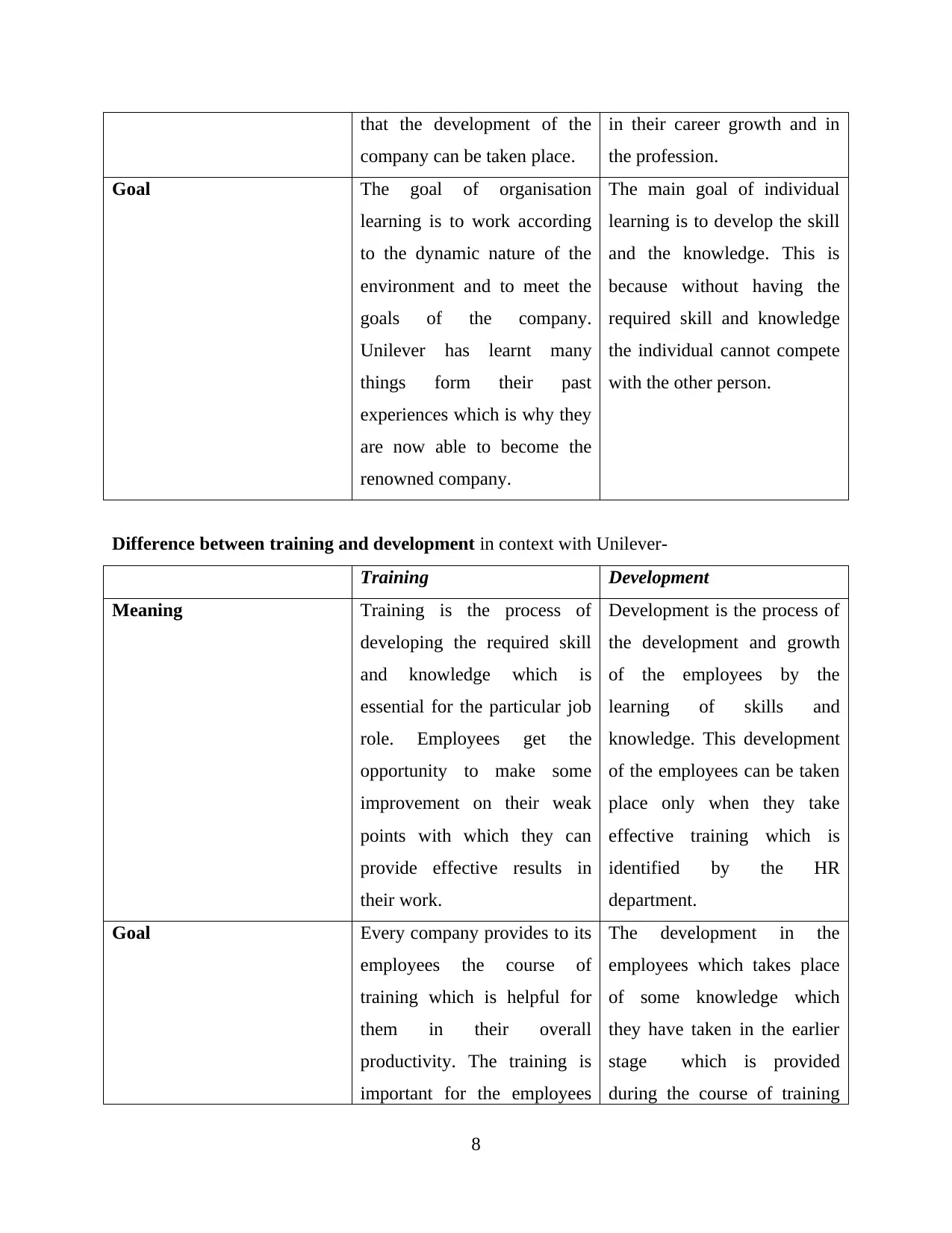
that the development of the
company can be taken place.
in their career growth and in
the profession.
Goal The goal of organisation
learning is to work according
to the dynamic nature of the
environment and to meet the
goals of the company.
Unilever has learnt many
things form their past
experiences which is why they
are now able to become the
renowned company.
The main goal of individual
learning is to develop the skill
and the knowledge. This is
because without having the
required skill and knowledge
the individual cannot compete
with the other person.
Difference between training and development in context with Unilever-
Training Development
Meaning Training is the process of
developing the required skill
and knowledge which is
essential for the particular job
role. Employees get the
opportunity to make some
improvement on their weak
points with which they can
provide effective results in
their work.
Development is the process of
the development and growth
of the employees by the
learning of skills and
knowledge. This development
of the employees can be taken
place only when they take
effective training which is
identified by the HR
department.
Goal Every company provides to its
employees the course of
training which is helpful for
them in their overall
productivity. The training is
important for the employees
The development in the
employees which takes place
of some knowledge which
they have taken in the earlier
stage which is provided
during the course of training
8
company can be taken place.
in their career growth and in
the profession.
Goal The goal of organisation
learning is to work according
to the dynamic nature of the
environment and to meet the
goals of the company.
Unilever has learnt many
things form their past
experiences which is why they
are now able to become the
renowned company.
The main goal of individual
learning is to develop the skill
and the knowledge. This is
because without having the
required skill and knowledge
the individual cannot compete
with the other person.
Difference between training and development in context with Unilever-
Training Development
Meaning Training is the process of
developing the required skill
and knowledge which is
essential for the particular job
role. Employees get the
opportunity to make some
improvement on their weak
points with which they can
provide effective results in
their work.
Development is the process of
the development and growth
of the employees by the
learning of skills and
knowledge. This development
of the employees can be taken
place only when they take
effective training which is
identified by the HR
department.
Goal Every company provides to its
employees the course of
training which is helpful for
them in their overall
productivity. The training is
important for the employees
The development in the
employees which takes place
of some knowledge which
they have taken in the earlier
stage which is provided
during the course of training
8
⊘ This is a preview!⊘
Do you want full access?
Subscribe today to unlock all pages.

Trusted by 1+ million students worldwide
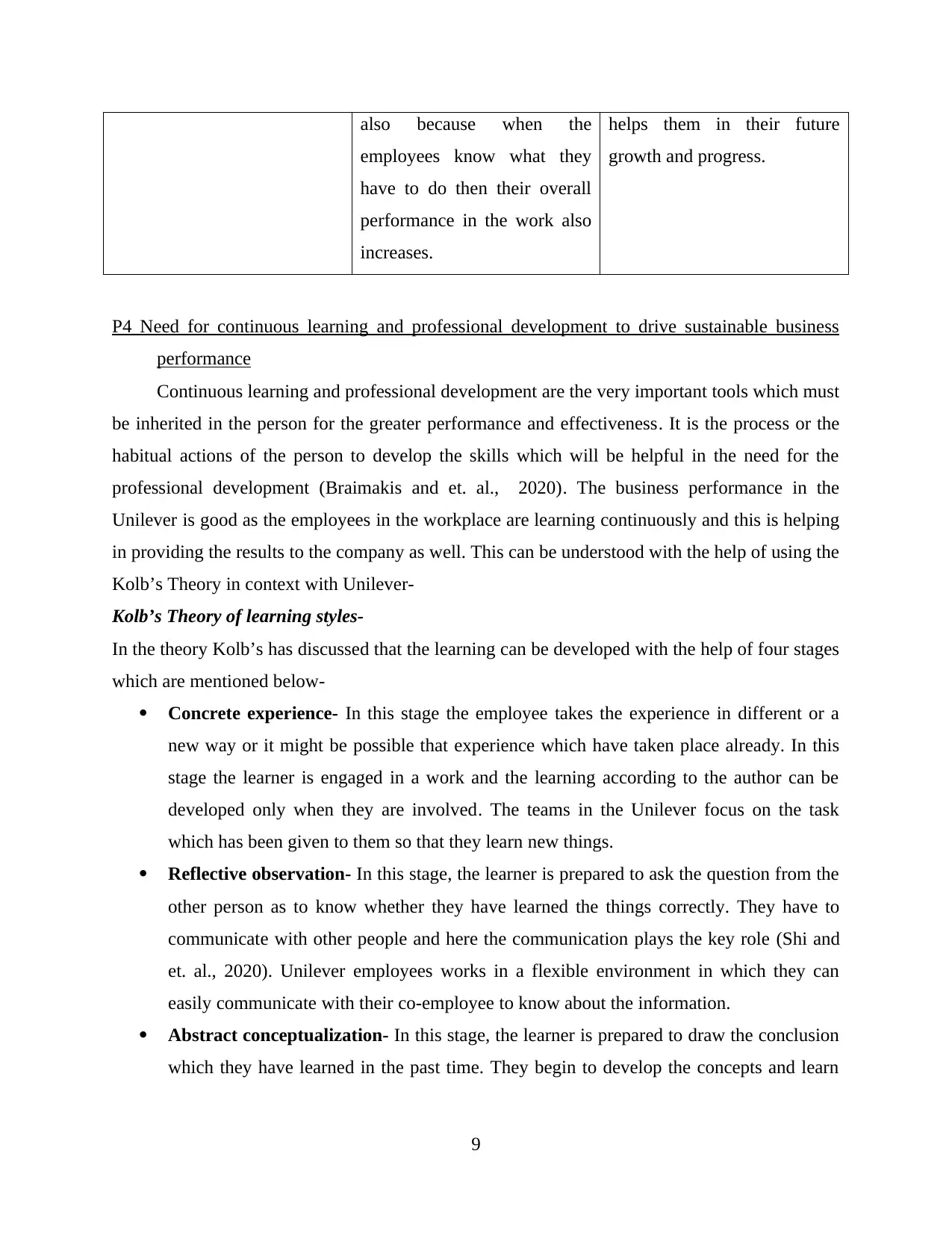
also because when the
employees know what they
have to do then their overall
performance in the work also
increases.
helps them in their future
growth and progress.
P4 Need for continuous learning and professional development to drive sustainable business
performance
Continuous learning and professional development are the very important tools which must
be inherited in the person for the greater performance and effectiveness. It is the process or the
habitual actions of the person to develop the skills which will be helpful in the need for the
professional development (Braimakis and et. al., 2020). The business performance in the
Unilever is good as the employees in the workplace are learning continuously and this is helping
in providing the results to the company as well. This can be understood with the help of using the
Kolb’s Theory in context with Unilever-
Kolb’s Theory of learning styles-
In the theory Kolb’s has discussed that the learning can be developed with the help of four stages
which are mentioned below-
Concrete experience- In this stage the employee takes the experience in different or a
new way or it might be possible that experience which have taken place already. In this
stage the learner is engaged in a work and the learning according to the author can be
developed only when they are involved. The teams in the Unilever focus on the task
which has been given to them so that they learn new things.
Reflective observation- In this stage, the learner is prepared to ask the question from the
other person as to know whether they have learned the things correctly. They have to
communicate with other people and here the communication plays the key role (Shi and
et. al., 2020). Unilever employees works in a flexible environment in which they can
easily communicate with their co-employee to know about the information.
Abstract conceptualization- In this stage, the learner is prepared to draw the conclusion
which they have learned in the past time. They begin to develop the concepts and learn
9
employees know what they
have to do then their overall
performance in the work also
increases.
helps them in their future
growth and progress.
P4 Need for continuous learning and professional development to drive sustainable business
performance
Continuous learning and professional development are the very important tools which must
be inherited in the person for the greater performance and effectiveness. It is the process or the
habitual actions of the person to develop the skills which will be helpful in the need for the
professional development (Braimakis and et. al., 2020). The business performance in the
Unilever is good as the employees in the workplace are learning continuously and this is helping
in providing the results to the company as well. This can be understood with the help of using the
Kolb’s Theory in context with Unilever-
Kolb’s Theory of learning styles-
In the theory Kolb’s has discussed that the learning can be developed with the help of four stages
which are mentioned below-
Concrete experience- In this stage the employee takes the experience in different or a
new way or it might be possible that experience which have taken place already. In this
stage the learner is engaged in a work and the learning according to the author can be
developed only when they are involved. The teams in the Unilever focus on the task
which has been given to them so that they learn new things.
Reflective observation- In this stage, the learner is prepared to ask the question from the
other person as to know whether they have learned the things correctly. They have to
communicate with other people and here the communication plays the key role (Shi and
et. al., 2020). Unilever employees works in a flexible environment in which they can
easily communicate with their co-employee to know about the information.
Abstract conceptualization- In this stage, the learner is prepared to draw the conclusion
which they have learned in the past time. They begin to develop the concepts and learn
9
Paraphrase This Document
Need a fresh take? Get an instant paraphrase of this document with our AI Paraphraser
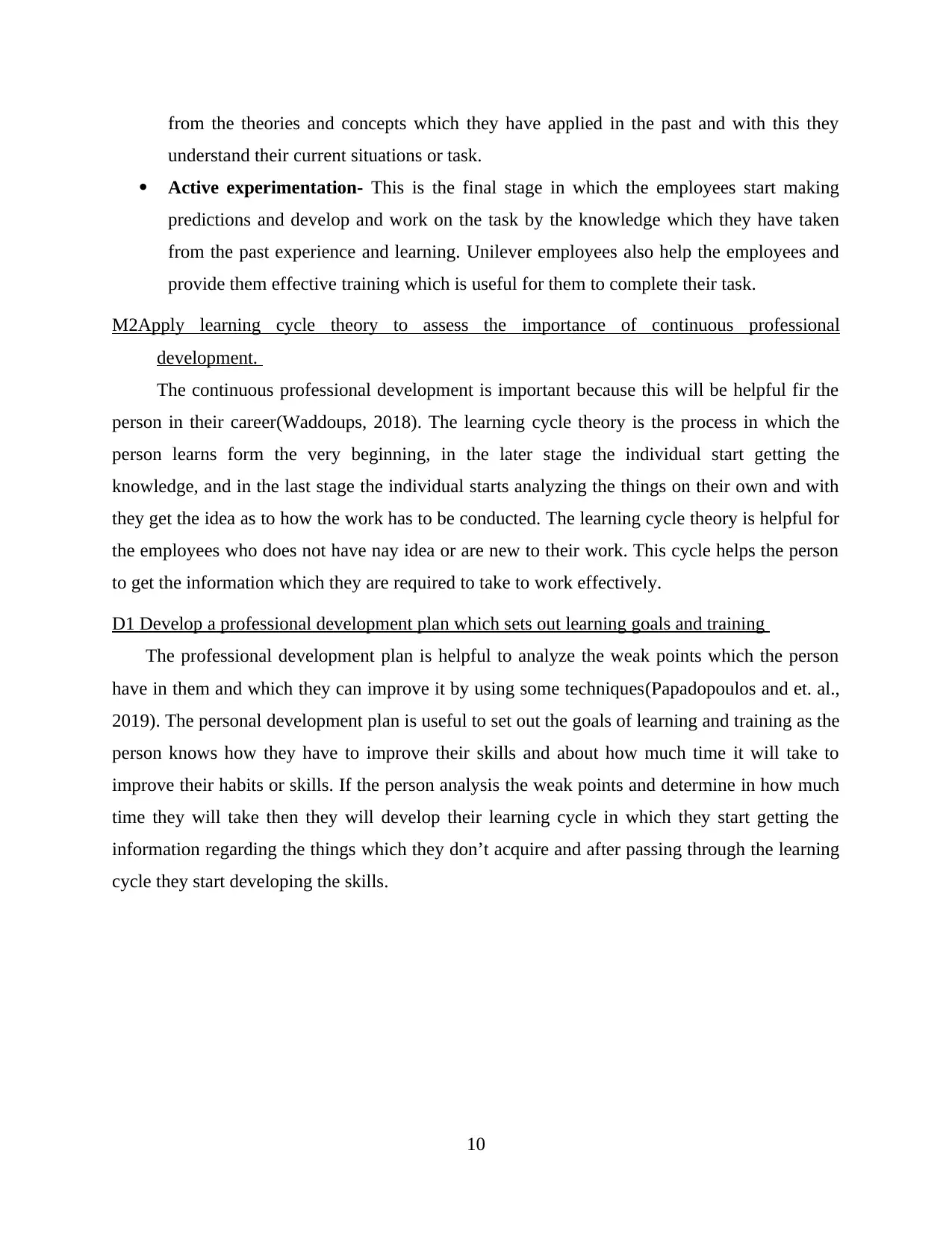
from the theories and concepts which they have applied in the past and with this they
understand their current situations or task.
Active experimentation- This is the final stage in which the employees start making
predictions and develop and work on the task by the knowledge which they have taken
from the past experience and learning. Unilever employees also help the employees and
provide them effective training which is useful for them to complete their task.
M2Apply learning cycle theory to assess the importance of continuous professional
development.
The continuous professional development is important because this will be helpful fir the
person in their career(Waddoups, 2018). The learning cycle theory is the process in which the
person learns form the very beginning, in the later stage the individual start getting the
knowledge, and in the last stage the individual starts analyzing the things on their own and with
they get the idea as to how the work has to be conducted. The learning cycle theory is helpful for
the employees who does not have nay idea or are new to their work. This cycle helps the person
to get the information which they are required to take to work effectively.
D1 Develop a professional development plan which sets out learning goals and training
The professional development plan is helpful to analyze the weak points which the person
have in them and which they can improve it by using some techniques(Papadopoulos and et. al.,
2019). The personal development plan is useful to set out the goals of learning and training as the
person knows how they have to improve their skills and about how much time it will take to
improve their habits or skills. If the person analysis the weak points and determine in how much
time they will take then they will develop their learning cycle in which they start getting the
information regarding the things which they don’t acquire and after passing through the learning
cycle they start developing the skills.
10
understand their current situations or task.
Active experimentation- This is the final stage in which the employees start making
predictions and develop and work on the task by the knowledge which they have taken
from the past experience and learning. Unilever employees also help the employees and
provide them effective training which is useful for them to complete their task.
M2Apply learning cycle theory to assess the importance of continuous professional
development.
The continuous professional development is important because this will be helpful fir the
person in their career(Waddoups, 2018). The learning cycle theory is the process in which the
person learns form the very beginning, in the later stage the individual start getting the
knowledge, and in the last stage the individual starts analyzing the things on their own and with
they get the idea as to how the work has to be conducted. The learning cycle theory is helpful for
the employees who does not have nay idea or are new to their work. This cycle helps the person
to get the information which they are required to take to work effectively.
D1 Develop a professional development plan which sets out learning goals and training
The professional development plan is helpful to analyze the weak points which the person
have in them and which they can improve it by using some techniques(Papadopoulos and et. al.,
2019). The personal development plan is useful to set out the goals of learning and training as the
person knows how they have to improve their skills and about how much time it will take to
improve their habits or skills. If the person analysis the weak points and determine in how much
time they will take then they will develop their learning cycle in which they start getting the
information regarding the things which they don’t acquire and after passing through the learning
cycle they start developing the skills.
10
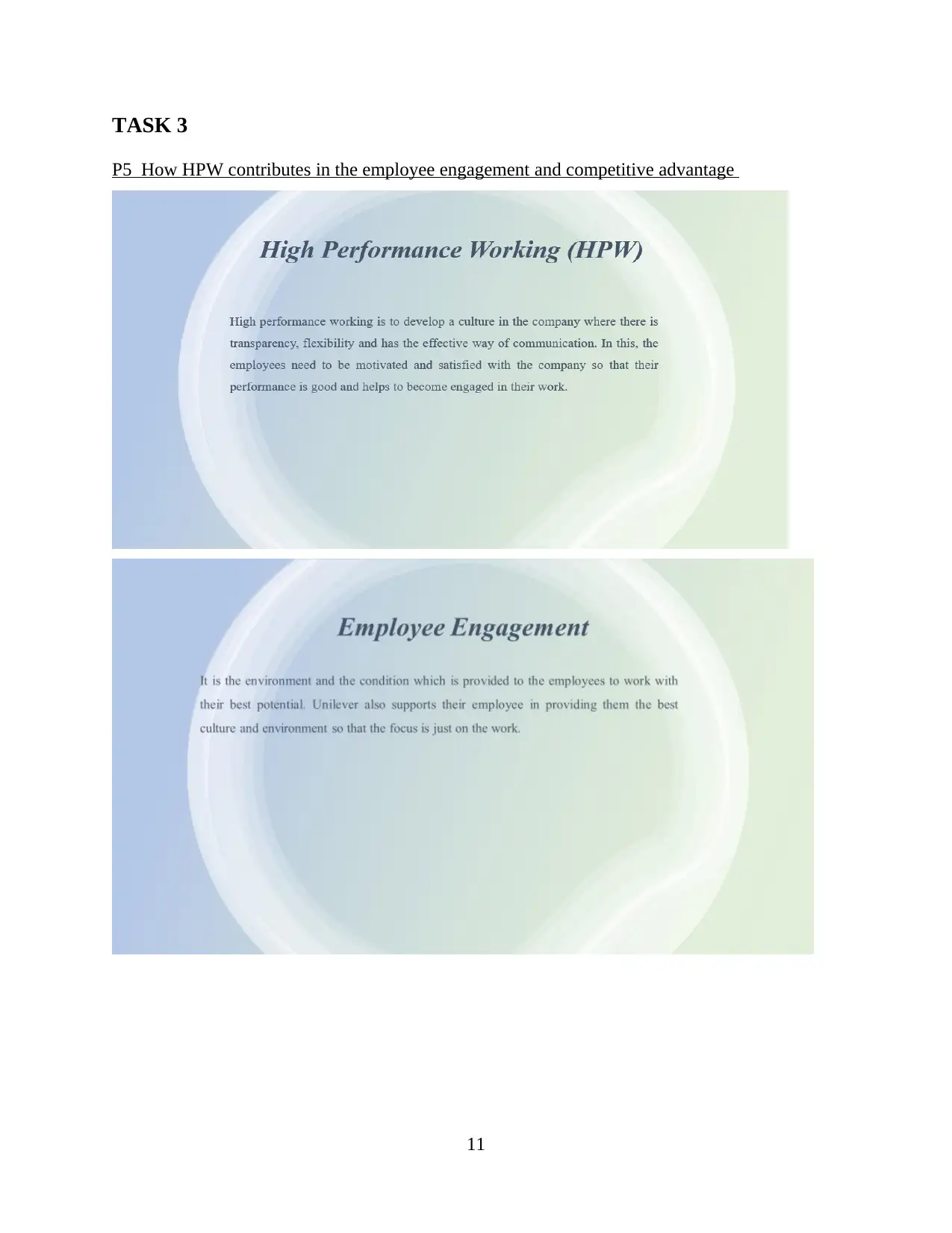
TASK 3
P5 How HPW contributes in the employee engagement and competitive advantage
11
P5 How HPW contributes in the employee engagement and competitive advantage
11
⊘ This is a preview!⊘
Do you want full access?
Subscribe today to unlock all pages.

Trusted by 1+ million students worldwide
1 out of 17
Related Documents
Your All-in-One AI-Powered Toolkit for Academic Success.
+13062052269
info@desklib.com
Available 24*7 on WhatsApp / Email
![[object Object]](/_next/static/media/star-bottom.7253800d.svg)
Unlock your academic potential
Copyright © 2020–2026 A2Z Services. All Rights Reserved. Developed and managed by ZUCOL.



